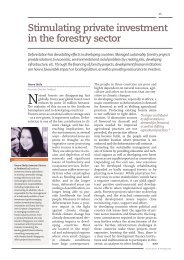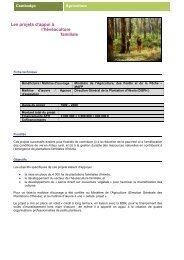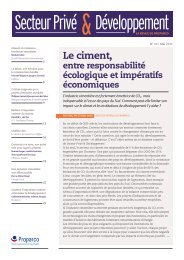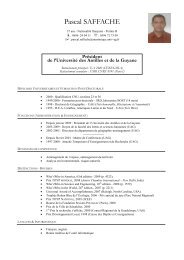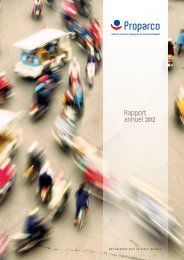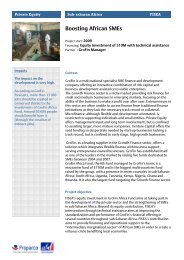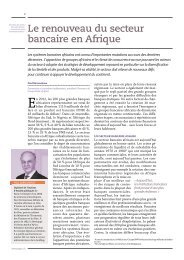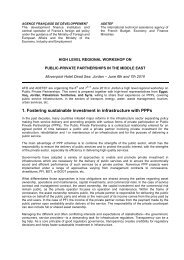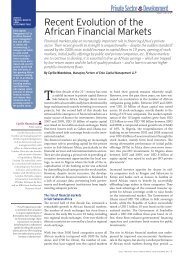Integrating Poor Populations in South African Cities - Agence ...
Integrating Poor Populations in South African Cities - Agence ...
Integrating Poor Populations in South African Cities - Agence ...
Create successful ePaper yourself
Turn your PDF publications into a flip-book with our unique Google optimized e-Paper software.
7. Access to Hous<strong>in</strong>g: The Ma<strong>in</strong> End Goal of Urban Development Policies<br />
additional subsidy, the National Social Hous<strong>in</strong>g Restructur<strong>in</strong>g Grant. To receive the grant,<br />
the project must target 30% households earn<strong>in</strong>g less than 3,500 rand and 70%<br />
households earn<strong>in</strong>g between 3,500 and 7,500 rand. In this way, the government<br />
wishes to foster densification and ensure residential solutions for needy populations <strong>in</strong><br />
urban areas, for example with<strong>in</strong> neighbourhoods near transit hubs. The Department of<br />
Hous<strong>in</strong>g drafted a bill to foster the development of social hous<strong>in</strong>g. The Social Hous<strong>in</strong>g<br />
Bill was f<strong>in</strong>ally passed <strong>in</strong> November 2008. This law recommends the creation of a<br />
regulatory body, the Social Hous<strong>in</strong>g Regulatory Authority (SHRA), to manage the<br />
various subsidies and supervise the <strong>in</strong>stitutions’ activities. In addition, it recommends<br />
giv<strong>in</strong>g the municipalities greater responsibilities and powers. This law should provide<br />
greater recognition of the stakes beh<strong>in</strong>d and challenges fac<strong>in</strong>g social hous<strong>in</strong>g and<br />
make it possible to position rental hous<strong>in</strong>g as a national concern and thereby foster its<br />
connection to economic development activities.<br />
Box 4.<br />
The Social Hous<strong>in</strong>g System <strong>in</strong> France<br />
Orig<strong>in</strong>s<br />
In France, social hous<strong>in</strong>g is rental hous<strong>in</strong>g offered by the collectivity at below-market<br />
prices to all households with <strong>in</strong>comes below a certa<strong>in</strong> threshold. Start<strong>in</strong>g <strong>in</strong> the end of the<br />
19 th century, the notion of “assisted hous<strong>in</strong>g” emerged with the aim of hous<strong>in</strong>g the work<strong>in</strong>g<br />
classes.<br />
107<br />
Target<br />
France follows a rather generalist concept of social hous<strong>in</strong>g whose mission is to<br />
provide hous<strong>in</strong>g to households that f<strong>in</strong>d themselves below maximum <strong>in</strong>come thresholds:<br />
<strong>in</strong> all, 19% of French households live <strong>in</strong> social rental apartments.<br />
The Actors<br />
In France, social hous<strong>in</strong>g management is organized <strong>in</strong> a precise way by the law, and<br />
all management organizations are subject to the rules of the construction and hous<strong>in</strong>g code.<br />
Management organizations are social hous<strong>in</strong>g companies (non-profit public limited<br />
companies), public hous<strong>in</strong>g offices (local public establishments), cooperatives, public<br />
limited real estate lend<strong>in</strong>g companies, and semi-public companies. These organizations’<br />
© AFD 2009 <strong>Integrat<strong>in</strong>g</strong> <strong>Poor</strong> <strong>Populations</strong> <strong>in</strong> <strong>South</strong> <strong>African</strong> <strong>Cities</strong>



